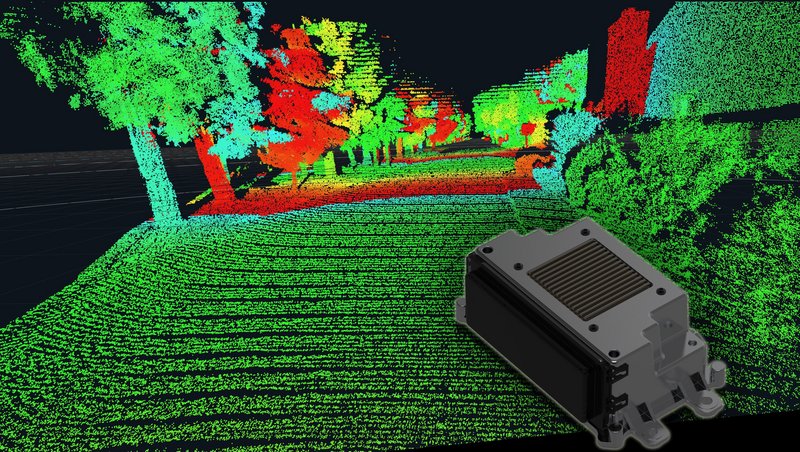Continental Integrates AEye’s Long-range LiDAR Technology into Full Stack Automated and Autonomous Solution
- Integration of AEye’s long-range, high performance LiDAR technology creates a unique offering that extends Continental’s integrated Automated Driving (AD) platform for passenger and commercial vehicles
- Full stack solution combines LiDAR, camera and radar technology
- Full system and standalone AEye-based long range LiDAR on track for start of production in 2024
- Multiple redundant sensor setup, based on different technologies, offers overall best autonomous driving system performance
- Advanced Driver Assistance Systems (ADAS) and Automated Driving (AD) markets expected to double in size by 2024
Auburn Hills, Mich., July 14, 2021 – On the path towards autonomous driving, system integration capabilities are critical to the development. Only ten months after joining forces in partnership with LiDAR expert AEye, Continental is integrating the long-range LiDAR technology into its full sensor stack solution to create the first full stack automotive-grade system for Level 2+ up to Level 4 automated and autonomous driving applications. The solution based on AEye’s LiDAR technology is a substantial part of the sensor setup for high level automation systems. It complements the radar, camera and ultrasonic technologies in Continental’s sensor system, and enables a reliable and redundant Automated Driving platform that can handle complex, diverse traffic scenarios and adverse weather conditions.
Complementary technology approach enables high level automation on the road
“Reliable and safe automated and autonomous driving functions will not be feasible without bringing the strengths of all sensor technologies together,” said Frank Petznick, head of Continental’s ADAS Business Unit. Complex and safety critical traffic scenarios, such as obstacles on the road and fast vehicles passing on highways, require high automation systems to have a maximum sensing range and image resolution to ensure sufficient response time. A single technology approach cannot fulfill this requirement. Continental’s complementary approach also ensures that the system can operate in all environmental conditions, including low sun, heavy rain, dense fog and cold or hot temperatures.
From start-up technology to affordable solutions for mass market applications
One of the most challenging parts of developing new technologies is to make them accessible to the mass market. Continental is now industrializing AEye’s reference technology for mass market production, which is critical to ensuring consistent quality that vehicle manufactures can rely on.
“Our partnership with AEye is unique because it enables Continental to build a new long-range LiDAR in a very short time, based on AEye’s reference architecture and software,” said Dr. Gunnar Juergens, Head of LiDAR Segment at Continental. “We will manage the entire product life cycle, including the development of a mass market product, as well as manufacturing, validation and testing according to automotive grade standards.”
The industrialization of new technologies is not new to Continental. The technology company has a long track record of making new cutting-edge technologies accessible for vehicle manufacturers around the globe. In 1999, Continental industrialized radar technology and was able to realize an affordable price point that helped bring important safety functions like emergency brake assist to market. Later this year, , based on more than 20 years of experience in Automotive LiDAR, Continental is launching the first solid-state short-range High Resolution 3D Flash LiDAR to the market.
“With AEye’s adaptive LiDAR technology, OEMs can optimize the field of view and resolution of the sensor for different use cases with software,” Petznick said. “This is a natural fit with our configurable full stack platform that seamlessly integrates cameras, radars, and LiDARs with our Automated Driving Control Units and software solutions to give light and commercial vehicle manufacturers the ability to easily select and combine the ADAS features they want within a wide breadth of vehicle models."
Sample production and ramp-up of series production
As a result of the partnership, Continental is already producing first samples of the new long-range LiDAR in its Ingolstadt plant in Germany. With these samples, Continental can drive further industrialization with a planned start of production of 2024. In parallel, Continental has started production line build-up preparations to ensure a smooth and timely transition from sample to series production.
Continental develops key components for assisted and automated driving all over the world. Last month, the company celebrated the start of construction on a new, state-of-the-art manufacturing facility in New Braunfels, Texas. As the demand for intelligent safety functions continues to increase, Continental is expanding its R&D and manufacturing capabilities to meet the growing demands.

Mary Arraf
Head of Communications Automotive and Continental North America


